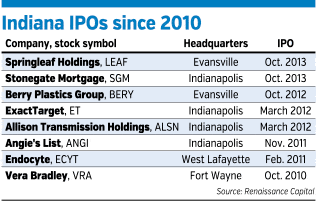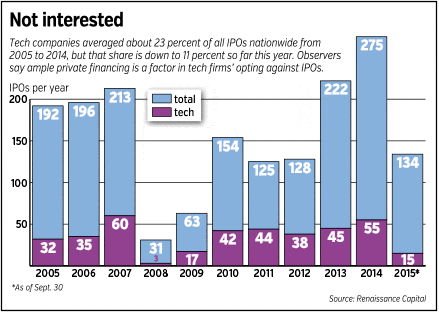Subscriber Benefit
As a subscriber you can listen to articles at work, in the car, or while you work out. Subscribe NowIndiana hasn’t seen a company launch an initial public offering in nearly two years. When the next IPO comes, it likely won’t be a technology company.
While the tech sector has been a hotbed for job creation and for attracting venture capital, it has been slow to spawn publicly traded companies. Lately, both the drawbacks to going public and the ease of raising private capital have increased, observers said, making IPOs and their exposure to the often-topsy-turvy stock market even less appealing for tech firms than before.
 Dorsey
DorseyIndustry experts, including High Alpha Managing Partner Scott Dorsey, don’t expect IPOs to completely fall out of favor. But, even when market conditions improve, they anticipate companies will take their time in pursuing IPOs, if they aren’t acquired first.
“I think it means that investors will need to be more patient,” said Dorsey, who formerly was CEO of ExactTarget, which in 2012 was Indiana’s last tech company to go public. “That path to an IPO, maybe in the past it was five to seven years; now, it might be seven to 10 or 12 years.”
For the handful of Hoosier companies that could see IPOs on their menus soon, there seems to be no rush. Indianapolis-based Scale Computing, which sells box-size IT infrastructure to small and medium-size businesses, had been rumored to be interested in an IPO since at least 2013.
After raising $18 million in July, Scale officials said they plan to pursue an IPO—in about two years.
Officials at Indianapolis-based MOBI, which raised $35 million in venture funding this summer, said an IPO could be a tool for turbocharging sales of its software that manages mobile devices for companies. But it won’t seriously consider it until 2017 or 2018.
Companies use IPOs to quickly raise enormous sums of capital, which they then use to expand and repay private investors.
But going public comes with costly regulatory requirements and quarter-by-quarter pressure to meet Wall Street expectations. That pressure has intensified in recent years as shareholder activism has increased, raising the prospect that investors will push for new management or a merger if performance misses expectations.
 Osborne
Osborne“The regulations and the level of scrutiny that you get in the public market, it’s almost not worth it,” said Michael Osborne, CEO of SmarterHQ, a marketing tech firm on track to be ripe for an IPO in the coming years.
“If we were in a position right now where we were timing a road show and thinking about going public, I would hold off,” he said.
The tech sector has consistently been a healthy contributor to U.S. IPOs, accounting for nearly a quarter of them from 2005 to 2014, according to IPO research firm Renaissance Capital. That’s the largest share for any sector over that span.
So far this year, however, the tech sector has yielded only 11 percent of IPOs, a seven-year low.
The lackluster showing comes at a time the industry is teeming with “unicorns,” or private companies that have disclosed $1 billion valuations. Research firm CB Insights counts 138 private billion-dollar startups, 62 of which have earned the label since the beginning of 2014. None of the 138 is Indiana-based.
Private markets rosy
Private capital is easier to come by, observers said, partly because low interest rates have sent venture capital firms, pension funds and other institutional investors scouring for opportunities to score higher returns. Some investors also fear missing out on the next home run.
So firms like Uber, which recently raised $1 billion in a private financing round, don’t need to tap public markets.
 “The bottom line is that the urgency for private tech companies to go public [driven by the need for capital and liquidity] is not there,” Paul Bard, director of research at Renaissance, said in an email.
“The bottom line is that the urgency for private tech companies to go public [driven by the need for capital and liquidity] is not there,” Paul Bard, director of research at Renaissance, said in an email.
Some observers point to the 2002 Sarbanes-Oxley Act, which ushered in increased oversight, as a turning point. New regulations stemming from the law continue to come online, adding to compliance costs.
“It costs significant time, energy and resources to be a public company,” said Don Aquilano of Carmel-based Allos Ventures. “Costs alone probably reach a couple million dollars a year in additional expense. For most companies, it’s not their first choice of exit.”
Scale has been one of the top Indiana destinations for venture capital, raising $64 million since its founding in 2007.
The company is not shunning the opportunity to go public, but simply taking its time.
“That’s certainly where I intend to take things,” CEO Jeff Ready told IBJ in July. “The first major step for us is to be profitable and self-sustaining, and I think this round of funding will get us there.”
 ExactTarget took a similar approach nearly a decade ago, but its decision had more to do with market dynamics. It first filed for an IPO in December 2007, just before the stock market plunged. So executives pulled back and raised $75 million from private investors instead.
ExactTarget took a similar approach nearly a decade ago, but its decision had more to do with market dynamics. It first filed for an IPO in December 2007, just before the stock market plunged. So executives pulled back and raised $75 million from private investors instead.
Dorsey said the move proved wise because it allowed the company to focus on long-term objectives versus short-term earnings, until it went public in 2012. (Salesforce.com went on to buy it for $2.5 billion in 2013.)
Delaying the IPO “was the best thing that ever happened to us,” Dorsey said. “We intentionally brought profitability down as we made a lot of investments, and when we went into the public markets, we roared in with a ton of momentum and growth.”
While entrepreneurs might be willing to delay IPOs, investors, many of which hope to exit in five to seven years, might not be.
 Love
Love“Every business owner needs to know, when that capital comes in, what guidelines are tied to that,” said Jay Love, CEO of software firm Bloomerang. “It may mean that there has to be a sale or an IPO within a certain number of years.”
Love co-founded and grew tech firm eTapestry with the help of such investors, and their time frame led them to seek a sale of the company in 2007.
IPOs still important
IPOs still have unique benefits. Dorsey said they bring a high level of distinction and credibility, as well as tremendous brand awareness. Osborne said they also bring exposure to the city.
“I think with IPOs, there’s a little more swagger with it,” said Ken Gramley, CEO of Emerging Threats, which was acquired by California-based Proofpoint this spring for $40 million. “Exits get you known within the venture community; IPOs get you known on Wall Street.”
And while the supply of venture capital might seem ample, venture capitalists often stipulate that their funds go toward growth rather than existing investors. Steve Fouty, a former ExactTarget executive who’s been involved with a number of companies where investors exited, said most venture investors want no less than 80 percent of their cash pegged for growth.
That leaves acquisitions or IPOs as the best way for all investors to get liquidity. And if a company’s value reaches astronomical figures, an IPO might be the only option.
“You get so big,” Osborne said, “you can’t unlock that kind of value without [going public]—no one’s going to give you $50 billion for your company.”•
Please enable JavaScript to view this content.
